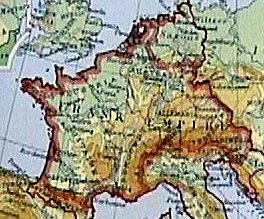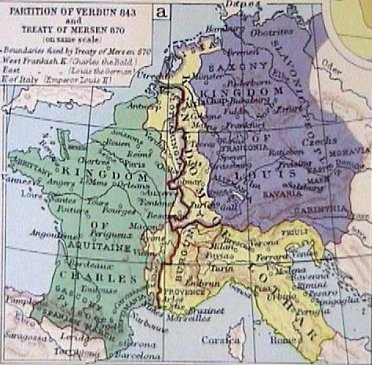 Charlemagne, King of the Franks
Charlemagne, King of the Franksand Emperor of the Holy Roman Empire Reigned: 768-814 c.742 - 814 Charlemagne, Continued from page 1 At Charlemagne's death in 814 only one of his three sons, Louis, was living. Louis' weak rule brought on the rise of civil wars and revolts. After Louis' death, his three quarreling sons split the empire between them by the Partition of Verdun in 843.
Chronology of Interest 772 - Charlemagne begins a series of long, blood-thirsty wars with the Saxons to the north of his kingdom. Only in 804, nearly thirty years later, was Saxonia conquered. These wars always kept Charlemagne very busy because there were other military conquests he was executing in other parts of modern-day Europe that demanded his time as well as his strategic abilities. 778 - Charlemagne launches offensive attack across the Pyrenees Mountains and into Spain, where he managed to penetrate as far as Saragossa. It is thought by most people that he was able to take Saragossa but this is not so. His focus on the destruction of Pamplona is the most probable reason for his failure to take the city. As he moved back, his rearguard, which employed several important generals, was completely destroyed. This is known as the Battle of Roncevaux. Around this time, Charlemagne also began his advance to the East due to unexepected turns in the on-going wars with Saxony. He fought hard against the Sorbs, Avars, Wends and most importantly, the Slavs, which he defeated easily and thus added the lands of Eastern Germany and Hungary to his growing empire. 782 - Saxons launch suprise attacks on Charlemagne's men with considerable success. Charlemagne responds by executing 4,500 Saxon prisoners in one day. 800 - After delegating much of his time and effort to help Pope Leo regain respect after a scandal, Charlemagne is coronated Emperor of the Holy Roman Empire at St. Peter's Basilica. This is the only instance in Papal history that a pope bowed to a mere mortal. However, Charlemagne prefered the title "King of the Franks" and continued to use that appellation. 802 - Charlemagne completes the establshment of his court at Aachen and attempts to gather the best scholars in Europe at his court in hopes of turning Aachen into an educational metropolis. Alcuin works with Charlemagne to develope the Palace School, a place where people from all walks of life could receive excellent education. A non-discriminate school of this caliber was revolutionary. Around this time, Charlemagne ordered that the old sagas of the Frankish people to be documented and he began grammar standards of his own language. He also attempted to purge plainchant of the various dialects so that it might become universal and be performed correctly. His kingdom was so large, however, that he was unable to acheive this. Also, attempts were made by his own men to sabotage the operation, which hindered him even more. This time of educational enlightenment is supplemented by Charlemagne's construction projects such as thermal baths, a cathedral in Revenna, and a massive 500 foot bridge over the Rhine River. < Charlemagne, page 1 |
All rights reserved. For details and contact information: See License Agreement, Copyright Notice. |

